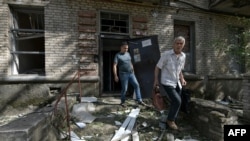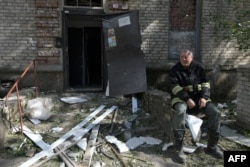Ukraine and Russia exchanged airstrikes early Saturday with Russia suffering casualties as Ukraine's drone attacks on the Russian-held Kherson and Luhansk regions left at least 28 people dead and 60 wounded. Russian airstrikes in eastern Ukraine damaged only buildings and power lines.
The attacks were reported by Russian state news Tass and Ukrainian officials respectively.
Initially, Ukraine's drone attacks Friday night on the small town of Sadove in the Russia-held Kherson region killed 22 and wounded 15 people, according to Moscow-backed Governor Vladimir Saldo.
On Saturday, the Russian state news agency Interfax said the number of the dead had increased to 28, citing regional authorities. Russian-installed Luhansk regional Governor Leonid Pasechnik declared Saturday a day of mourning in the region, with public events canceled.
Russia's Defense Ministry said Saturday that it downed 25 drones over Russia's southern Kuban and Astrakhan regions, the western Tula region, and the Moscow-annexed Crimean Peninsula.
Also on Saturday, Russian officials said their air defenses for the first time shot down Ukrainian drones over the North Ossetia region in the North Caucasus, about 900 kilometers (559.2 miles) southeast of the front line in Ukraine's partially occupied Zaporizhzhia region.
The Ministry of Defense said that one drone had been destroyed, but North Ossetia regional Governor Sergei Menyailo reported three downed drones and said the target was likely a military airfield.
Ukrainian air defense overnight shot down a Russian X-59 Russian missile and nine out of 13 Iranian-made Russian drones over four regions: the central Poltava region, southeastern Zaporizhzhia and Dnipropetrovsk regions, and the Kharkiv region in the northeast, Ukraine's air force said Saturday.
Dnipropetrovsk regional Governor Serhiy Lysak said the overnight drone attack damaged some buildings and power lines.
Biden, Macron reiterate support
Ukraine was one of the topics U.S. President Joe Biden discussed with French President Emmanuel Macron during his state visit to Paris after the commemoration of the 80th anniversary of the D-Day landings.
In a joint statement, the two leaders expressed concern over weapon transfers to Russia from Iran and North Korea as well as Chinese deliveries of materials that could be used by Russia's defense industry.
"Putin is not going to stop at Ukraine," Biden said alongside Macron after talks at the Elysee Palace. "All of Europe will be threatened, we are not going to let that happen."
Biden said the United States "is standing strong with Ukraine. We will not — I say it again — walk away."
The two leaders also discussed backing steps to restrict the transfer of Russian money through the U.S. and French financial systems and to support the use of frozen Russian assets for Ukraine's needs.
The idea has drawn concerns from some countries, but a U.S. Treasury official said Tuesday the United States and its G7 partners were making progress.
Biden authorizes more for Ukraine
Biden has signed an additional $225 million military package for Ukraine to support its forces as they fight Russia's assault near Kharkiv, said a statement Friday.
This is the sixth tranche Biden has authorized for Ukraine since he signed the national security supplemental measure. The package includes air defense interceptors, artillery systems and munitions, armored vehicles, anti-tank weapons, and other capabilities.
It also will help strengthen Ukraine's air defenses that would protect Ukraine's electric grid from Russian attacks and reinforce Ukrainian capabilities across the front lines, the statement said.
U.S. support for Ukraine is being promised as Ukraine's outgunned and outmanned troops struggle to fend off a renewed Russian offensive along the roughly 1,000-kilometer (621.3-mile) front line in Ukraine's eastern border regions of Kharkiv and Donetsk.
Additionally, Washington and some NATO allies such as France and Germany, have softened their position to allow Ukraine to use some Western weapons for attacks inside Russia along the border in the Kharkiv region.
Russian threats
The Kremlin has warned that the decision could lead to a widening of the conflict in Europe that could entangle Western allies against Russia.
Russian President Vladimir Putin also warned the United States and NATO allies that allowing Ukraine to fire long-range, Western-made weapons into Russia could prompt him to place similar Russian weapons in countries within range of the U.S. or its European allies.
"If somebody's actions threaten our sovereignty and territorial integrity, we consider it possible to use all means at our disposal," Putin said, on the sidelines of the annual St. Petersburg International Economic Forum Wednesday, citing what he described as his country's security policy.
Some information for this report came from The Associated Press, Reuters and Agence France-Presse. VOA's Kim Lewis contributed to this story.






